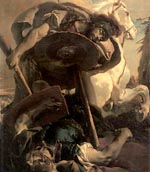The Works of Statius
Although he composed various other works, Publius Papinius Statius is primarily known for his two epic poems, the Thebaid and the Achilleid, plus a collection of occasional (created for a particular occasion) poetry known as the Silvae. For purposes of understanding the role of Statius in Dante's Commedia, it is important to remember that Dante and the rest of the medieval world were not aware of the Silvae which wasn't "rediscovered" until the early 1400s. Therefore, Dante's impressions of Statius, as well as any influence upon his work, would have come from the two epics.
For English Translations of Thebaid and Silvae:
And for the overly educated who want to read Latin Translations of all three works:
from Eteocles & Polynices
by TiepoloA brief summary: In Thebaid, Statius describes the battle for the throne of Thebes by the two brothers, Polynices and Eteocles, the sons of Oedipus.. Unlike in Statius' Achilleid, the Thebaid has no central figure or hero. The first six books deal with events leading up to the war, and the last six are devoted to the war itself and its final outcome. The brothers Eteocles and Polynices slay each other in book eleven, but it is the twelfth book, in which Theseus of Athens defeats Creon, which is the culmination of the poem. In book twelve, Theseus imposes order and piety on Thebes; it is the restoration of harmony and justice
Within book twelve, Statius states he spent twelve years writing Thebaid. As it is a twelve-book series, that is an average of one year per book to complete. The set was published in 92 A.D.
In the epilogue, Statius, who was taught by his father to revere Virgil as "the great master, who should be imitated but could not be rivaled" (Dilke 3). also makes clear that Thebaid must not challenge the supremacy of the Aeneid, but "follow afar off" (Slater 13).
Statius began writing the Achilleid in the summer of A.D. 95, approximately one year shy of his death, but died before he could complete it. The Achilleid tells of the life and adventures of Achilles. Originally, Statius intended to cover the entire life of this Greek hero. Statius stated that whereas Homer dealt with the hero's career at Troy up to the death of Hector, he would "sing of the concealment of Achilles in Scyros and his discovery by the Greeks, and also the whole of the Trojan War" (Dilke 7).
Statius was only able to complete not quite two books of the Achilleid before his death. Book I deals primarily with Achilles (disguised as a maiden) in Scyros. Book II, of which only 167 pages were completed, deals with the voyage to Troy, gives brief descriptions of the causes of the War and a boastful account by Achilles of his childhood in Thessaly (Dilke 8).
The Achilleid was considered a very important work during the Medieval Period. All school children were required to study it.
Olive Grove
Statius' Silvae (from the Latin for woods, forests, groves) is a series of five books comprising thirty-two occasional poems. These poems tell of delight, anxiety, praise and the tension which existed within the later periods of Domitian's reign (A.D. 81-96.) Five of the poems were dedicated to the Emperor Domitian which has drawn criticism as Domitian is generally considered to have been a tyrant. However, this charge is usually countered with the claim that poets had to support the Emperor in order to survive, and that Statius died too close to the death of Domitian to have had time to retract his support as did other poets.
The verse of these poems is in various meters and, at the time, was considered to be in a new style. Some of these poems were written in two days or less. Silvae 5.4, Statius' "Ode to Sleep", is considered one of the best Latin poems ever written
The last poem found in the Silvae is a reflection of Statius's own desire for children; this poem expresses his sorrow at the death of an adopted child.

